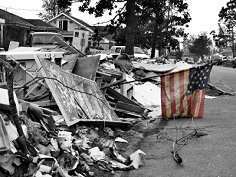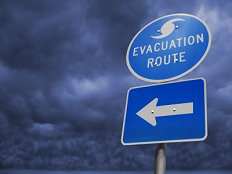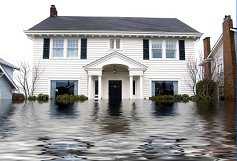... And All Hell is Likely to Break Loose Soon After.
It's easy to name several major disasters that have struck and the cost to human life over the years. How many lives could have been saved with just a few warnings in advance that people should have started moving out of the area or, at the least, moved out of the immediate danger zone of mass casualties?
Consider Hurricane Katrina, and the New Orleans levees that flooded over. That should have been an easy disaster to see coming. How many people lost their homes in that disaster, and ended up homeless?
Moving to Avoid a Disaster
Look at Seattle, Washington for example... There's a lot more well to do people living in Seattle than New Orleans. A major earthquake is said by scientists to be long over-do. What will happen when that major earthquake finally hits? Residents of New Orleans may have missed the opportunity to move before Hurricane Katrina struck in 2005...
But residents of Seattle know that this earthquake is a probable disaster at some point in the near future. Maybe it would be smart to seriously consider moving out of the area, before Seattle finds itself buried under rubble, from a 9.0 or stronger mega earthquake.
Moving to Avoid a Terrorist Attack
Then of course there's the terrorist threat. Mega Target Cities like New York City, Washington D.C., Chicago and Los Angeles are high or at the top of likely terrorist first strikes with weapons of mass destruction. That could be anything from a nuclear weapon, to a highly lethal virus, or even just a serious of "dirty bombs" (smaller bombs that disperse nuclear radiation within a small geographical area).
Moving to Avoid Riots and Looting
Most major cities around the U.S. are at risk for violent rioting and widespread looting in the wake of a major catastrophic disaster striking within the U.S.
What I'm referring to is a disaster that strikes that is bigger than any previous disaster in U.S. history, and causes mass-fear and panic to strike citizens from all walks of life.
People who live in the inner cities typically don't have the money to stockpile food, water and supplies -- not in the same way and with the same level of assurance as people living in more distant areas can. At the same time, people in the inner cities are at serious risk from neighborhood gangs and criminal elements simply taking anything they have to eat or drink by force, making it less likely that people in the inner cities are getting ready today and preparing in advance to survive a major disaster.
That means that better off residents living in nearby suburbs are at high risk of inner city rioting and looting taking place, where they are simply stripped of everything they own, beaten, women raped, and some people murdered for getting in the way.
Millions of Americans who today live within a few miles of major cities or further should be giving serious consideration to moving 20, or 30, or even 100 miles away, at the very least to minimize the danger of rioting and looting taking place.
Where Are You Moving To? Several Factors to Consider Before Moving
- Moving Away from Prevailing winds - If a nuclear weapon strikes the nearest major city in your region, what direction will the wind most likely carry fallout (radiation)?
- Don't Move Near Critical Infrastructure - You may live out in the countryside already but are you in a region that is a mass-producer of oil, natural gas, or electricity, or major agriculture, or mineral mining? That could be an area seized for it's perceived wealth by an invading army. It may not be wise to move near "critical infrastructure".
- Don't Move to Any Towns with Airports - Any region with an airport, even a small airport, might not be a wise area to settle in for the purpose of surviving a catastrophic disaster. Most likely an invading army would be a risk within a few months time, considering how many nations currently have their eyes on United States wealth and resources. Airports would be marked on a map, and even a number of small towns with airports could be some of the first places seized in an invasion, as airports offer invading armies ways to move troops and equipment into multiple areas.
- Climate Can Effect Moving - How is the climate overall and is there any noticeable agriculture within the region you want to move to? Cold extremes may be better dealt with than heat extremes, meaning that it may be a lot more comfortable and plausible to survive in a cold climate long term, than a really hot climate. In a time following catastrophic disaster electricity may have been knocked out to an area permanently, which means no air condition to help keep cool during long, hot summers.
- Moving To a Colder Climate Like Canada or Alaska -
On the other hand, in a cold climate there are several ways to keep warm year round, even at 40 degrees below zero. Often just wearing multiple layers can do the trick. An insulated home or other kind of shelter can also go a long way.
- Moving To a Tropical or Sub-Tropical Climate - While a hot, dry climate might not be the best idea long term (water could become an issue as well), on the other hand a warm or even hot but wet climate can make for suitable living. These are your more sub-tropical and tropical zones and usually the ocean is not far off where a person can exist off edible sea life and vegetation.
- Moving To The Mountains - Living in the mountains means a life where you live a lot like the migrating wildlife you would be having to live off. As the snow level drops in the winter, you would move to lower elevations, just below the snow line. Large game is known for migrating to different elevations with the seasons, and large game hunting is a great way to survive long term (for those with experience hunting or those who simply live with people who can hunt).
- Moving To The Coastline - Native Americans and various tribes around the world have made a great way of life living off the coastline and everything that the ocean can provide for food. All types of edible sea life exist along remote coastlines around the world. Rivers and streams that descend to the oceans from inland carry fresh water, and some may carry an excellent food source -- salmon (check what region of continent you are in for local fresh water fish that can be found in lowland rivers that connect with the ocean).
Do It Yourself Moving or Do You Hire A Moving Company?
That just depends. Most people with a home will be better off hiring a moving company, considering how much they are moving, as opposed to someone who lives in a 1 or 2 bedroom apartment. Those people can often turn to do it yourself moving, and get it done with just a friend or two helping out.
Whatever your plans for moving are, those plans should be in advance of a disaster taking place, and not afterward. If you wait for a disaster to strike before moving, you run the risk that there may be no moving companies in operation in your region (remember, this is a catastrophic disaster we are talking about), nor may there be anything left of the freeway system. Now you're basically stuck with the small amount of items you can carry.
So, if moving away to somewhere much safer is part of your long term strategy for surviving a disaster, you might want to call that moving company sooner than later.
REFERENCES:
Common Moving Mistakes People Make
Next Section: Survive Hard Economic Times and Possible Collapse of the U.S. Dollar








